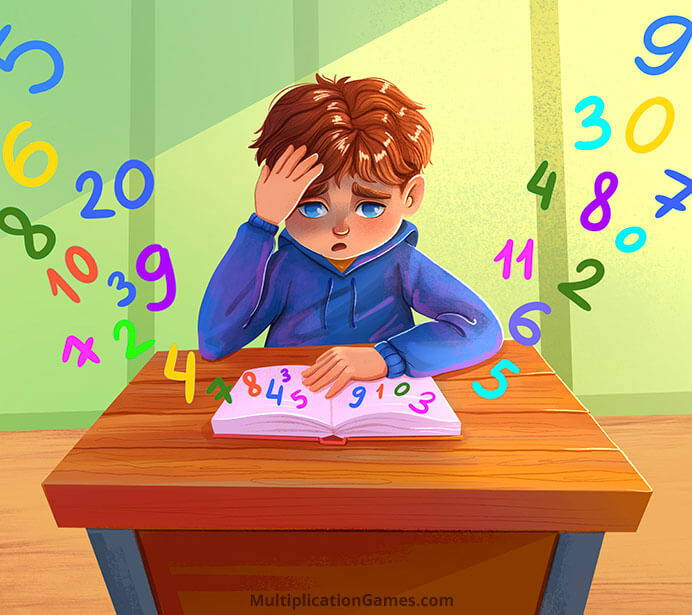7 Reasons Math May Be Harder for Your Child
By Megan - 12/18/2022
Math is one of the most difficult subjects in school for many kids. In fact, research shows that the majority of elementary school kids struggle to understand the complexities of math, and many find it challenging to keep up with their teachers.
Although there are always outliers in every class, it’s common for parents to wonder why it’s so difficult for their children to learn new math skills. Perhaps, the major reason is that kids are dealing with numbers and equations that take persistent practice to master.

Since we learn a language at a young age, it’s often easy to grasp reading, writing and history classes that are rooted in memorable facts. On the other hand, math activates a different portion of the brain, pushing many kids out of their natural comfort zone.
In order to clarify this common concern, we are going to dive into the reason why math may be harder for some students. Keep reading to learn everything you need to know.
1. Difficulty concentrating
Many kids find math boring, so they struggle to maintain concentration and attention through each step of the equation. Once a child loses focus, they might make mistakes and get discouraged to try again. This creates a cycle when kids believe they are innately bad at math when in reality, they struggle to concentrate long enough to effectively problem solve.
If you think your kids struggle with paying attention to math problems, consider integrating math games into their study routine. Online games can create an engaging environment that relieves the barrier to entry that might be holding your child back.
2. Lack of patience
Math requires a lot of patience which is not something that many young kids have a lot of in the age of technology. Math is a multi-step process, so one equation may take a long time to solve before getting the correct answer. Once kids begin to get impatient with math and their inability to solve a problem quickly, they can get a bad taste in their mouths about the subject overall.
If you know your child struggles with a lack of patience, consider helping them get comfortable with quick and easy math equations. Practice lightning rounds with them that allow them to move through questions quickly without losing interest.
3. Difficulty understanding new problems
There are plenty of reasons why your child may struggle to understand math equations. In most cases, the teacher will present a math strategy to the class and walk them through every step of the process. Your child may try the equation for themselves and feel confident in their understanding. However, since math is so subjective, they may later encounter a difficult problem that causes them to lose confidence.
Once your child starts learning higher-level math skills, it’s a good idea to review the material at home to ensure they understand everything. Many kids will try to memorize strategies just to realize that they don’t really know how to do them on their own. Offer additional support, and make sure to check in with your child’s teacher if they miss a day of school.
4. Learning difficulties
There are a lot of uncontrollable circumstances that can make learning hard for kids, especially in elementary school. Some children struggle with ADD, ADHD, dyslexia, autism, and other intellectual disabilities. All of these factors can contribute to difficulty focusing, learning new skills, retaining information, controlling their patience, and processing new ideas in an over-stimulating classroom environment.
If your child struggles with any of these neurodivergent challenges, it’s a good idea to speak with their teacher about how you can support their education. Some kids thrive by having a one-on-one tutor that allows them to get direct attention during the learning process.
5. The left brain vs. right brain phenomenon
In school, you may have heard people describe their preferred learning style by saying they are left-brained or right-brained. For example, left-brained refers to a natural inclination toward analytics, problem-solving and logic that may be found in math, science and tech-based subjects.
On the other hand, right-brained people are typically the more creative types, gravitating towards fluid skills like art, writing, and reading which may be found in drama, music or English classes. It’s true that no one is necessarily hard-wired one way or the other, which is why we are all capable of performing skills across the board. However, anecdotal stories confirm that people are partial to one or the other at an early age. If your child is right-brained, math may be out of their natural comfort zone, posing more difficulties for them.
6. Fewer opportunities
In general, there are a lot of opportunities for kids to learn other skills, from science fairs, book clubs, drama clubs, music classes, and extracurricular sports. Since math is not as easily practiced as a leisurely hobby, kids have fewer opportunities to explore the subject outside of class. Some schools will offer a mathletes club, and even then, many kids have judgements about stepping outside of their comfort zone for a seemingly ‘boring’ subject.
If you want to expose your child to more opportunities, consider showing them physical and digital math games that bring an aspect of fun to the subject. Sometimes kids just need more exposure to math in order to be successful.
7. Anxiety around math
If your child gets nervous, defiant, fidgety or upset at the thought of doing math, they may struggle with math anxiety. Many kids will struggle with math anxiety in a test environment, especially if they find it hard to think clearly on the spot. Sometimes kids can get anxious doing homework or answering their teacher in class.
If math is out of your child’s natural comfort zone, math anxiety is a common side effect. A great way to combat math anxiety is to talk openly with your child about their concerns. Create a safe and uplifting environment for them to practice math without judgment. Help them develop healthy coping mechanisms so that they can focus and find their flow state without letting anxiety take over.
The Takeaway
Some kids will find that math comes easy to them, whereas others will struggle with it regardless of their intellect. Make sure your child understands that there is nothing wrong with them if they aren’t excelling in math.
Everyone is on their own educational journey, and all of us hold our own unique strengths and weaknesses. The more that your child familiarizes themselves with math, the easier it will become to navigate difficult problems with ease.






